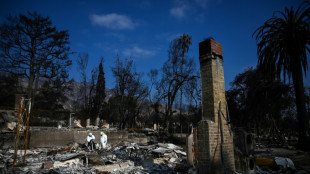
-
 Norris fastest in Japan GP first practice, Tsunoda sixth on Red Bull debut
Norris fastest in Japan GP first practice, Tsunoda sixth on Red Bull debut
-
Albon says Thailand taking bid for F1 race 'very seriously'

-
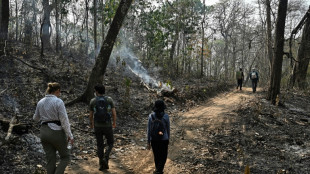 'It's gone': conservation science in Thailand's burning forest
'It's gone': conservation science in Thailand's burning forest
-
Protest as quake-hit Myanmar junta chief joins Bangkok summit
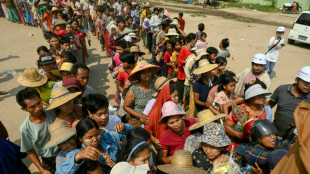
-
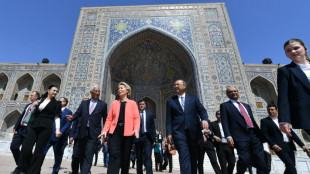 EU leaders push for influence at Central Asia summit
EU leaders push for influence at Central Asia summit
-
Asian stocks extend global rout after Trump's shock tariff blitz

-
 Lewandowski, Mbappe duel fuelling tight La Liga title race
Lewandowski, Mbappe duel fuelling tight La Liga title race
-
South Korea court upholds President Yoon's impeachment, strips him of office

-
 Liverpool march towards title as Man City face Man Utd
Liverpool march towards title as Man City face Man Utd
-
Finland's colossal bomb shelters a model for jittery Europe

-
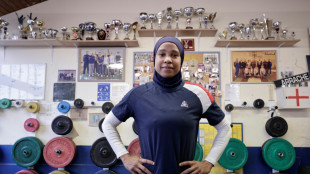 Athletes frustrated as France mulls Muslim headscarf ban in sport
Athletes frustrated as France mulls Muslim headscarf ban in sport
-
Korda downs Kupcho to stay alive at LPGA Match Play

-
 German industry grapples with AI at trade fair
German industry grapples with AI at trade fair
-
Irish school trains thatchers to save iconic roofs

-
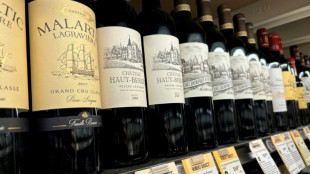 'Frightening': US restaurants, producers face tariff whiplash
'Frightening': US restaurants, producers face tariff whiplash
-
Cuba looks to sun to solve its energy crisis
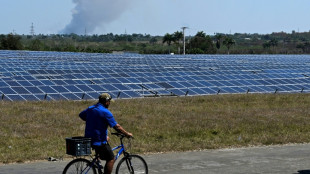
-
 Experts warn 'AI-written' paper is latest spin on climate change denial
Experts warn 'AI-written' paper is latest spin on climate change denial
-
PSG eye becoming France's first 'Invincibles'

-
 Late birdie burst lifts Ryder to Texas Open lead
Late birdie burst lifts Ryder to Texas Open lead
-
Five potential Grand National fairytale endings

-
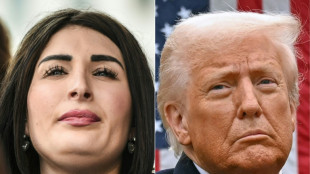 Trump purges national security team after meeting conspiracist
Trump purges national security team after meeting conspiracist
-
More work for McIlroy even with two wins before Masters

-
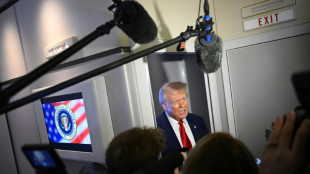 Trump hopeful of 'great' PGA-LIV golf merger
Trump hopeful of 'great' PGA-LIV golf merger
-
No.1 Scheffler goes for third Masters crown in four years

-
 Where Trump's tariffs could hurt Americans' wallets
Where Trump's tariffs could hurt Americans' wallets
-
Trump says 'very close to a deal' on TikTok

-
 Trump tariffs on Mexico: the good, the bad, the unknown
Trump tariffs on Mexico: the good, the bad, the unknown
-
Postecoglou denies taunting Spurs fans in Chelsea defeat

-
 Oscar-winning Palestinian director speaks at UN on Israeli settlements
Oscar-winning Palestinian director speaks at UN on Israeli settlements
-
With tariff war, Trump also reshapes how US treats allies
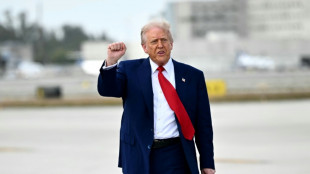
-
 Fernandez fires Chelsea into fourth as pressure mounts on Postecoglou
Fernandez fires Chelsea into fourth as pressure mounts on Postecoglou
-
South Korea court to decide impeached president's fate

-
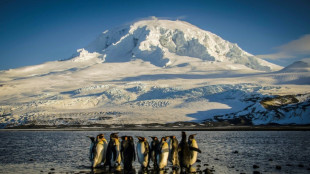 Penguin memes take flight after Trump tariffs remote island
Penguin memes take flight after Trump tariffs remote island
-
E.T., no home: Original model of movie alien doesn't sell at auction

-
 Italy's Brignone has surgery on broken leg with Winter Olympics looming
Italy's Brignone has surgery on broken leg with Winter Olympics looming
-
Trump defiant as tariffs send world markets into panic
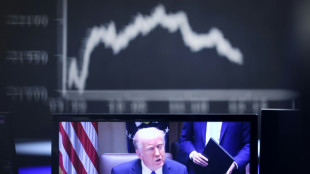
-
 City officials vote to repair roof on home of MLB Rays
City officials vote to repair roof on home of MLB Rays
-
Rockets forward Brooks gets one-game NBA ban for technicals

-
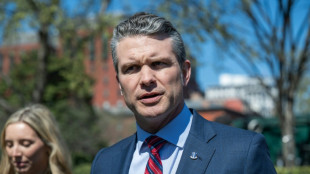 Pentagon watchdog to probe defense chief over Signal chat row
Pentagon watchdog to probe defense chief over Signal chat row
-
US tariffs could push up inflation, slow growth: Fed official
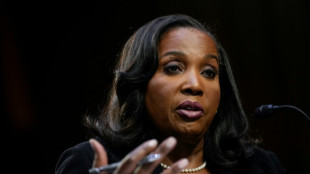
-
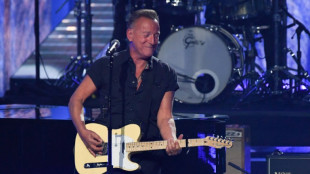 New Bruce Springsteen music set for June 27 release
New Bruce Springsteen music set for June 27 release
-
Tom Cruise pays tribute to Val Kilmer

-
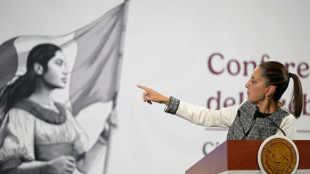 Mexico president welcomes being left off Trump's tariffs list
Mexico president welcomes being left off Trump's tariffs list
-
Zuckerberg repeats Trump visits in bid to settle antitrust case

-
 US fencer disqualified for not facing transgender rival
US fencer disqualified for not facing transgender rival
-
'Everyone worried' by Trump tariffs in France's champagne region

-
 Italy's Brignone suffers broken leg with Winter Olympics looming
Italy's Brignone suffers broken leg with Winter Olympics looming
-
Iyer blitz powers Kolkata to big IPL win over Hyderabad

-
 Russian soprano Netrebko to return to London's Royal Opera House
Russian soprano Netrebko to return to London's Royal Opera House
-
French creche worker gets 25 years for killing baby with drain cleaner


Main points of the $300 billion climate deal
The deal reached at UN climate talks in Azerbaijan ramps up the money that wealthy historic emitters will provide to help poorer nations transition to cleaner energy and adapt to global warming.
Here are the main points of the agreement reached at COP29 in Baku:
- $300 billion -
Under a framework established by the UN in 1992, 23 developed countries -- and the European Union -- historically responsible for most planet-heating emissions are obliged to contribute to climate finance.
The Baku accord raises the amount of money that developed countries must provide to at least $300 billion per year by 2035.
It is higher than the $100 billion that is currently required under a previous agreement that runs until next year.
But it falls well short of the $500 billion that some developing countries had demanded at the fraught negotiations in Baku.
The deal states that the money will come directly from a "wide variety of sources" including government budgets, private sector investment, and other financing.
It also cites "alternative sources" -- a reference to potential global taxes under discussion on the aviation and maritime industries, and the rich.
The hope is that the money from developed countries will help boost private investment to reach an ambitious goal -- written into the deal -- of delivering at least $1.3 trillion per year by the next decade.
That is the amount that experts commissioned by the United Nations said was needed by 2035.
"With these funds and with this structure, we are confident we will reach the 1.3 trillion objective," EU climate commissioner Wopke Hoekstra told fellow COP29 delegates.
- China role -
The United States and EU had pushed to broaden the donor base to include countries that are still listed as developing but have now become wealthy, such as China and Saudi Arabia.
But China, the world's second-biggest economy and top emitter of greenhouse gases, has steadfastly refused to change its status while recalling that it already provides bilateral aid.
The deal states that developed nations would be "taking the lead" in providing the $300 billion -- implying that others could join.
The text "encourages" developing countries to "make contributions" that would remain "voluntary".
There was one novelty: the climate finance that developing countries such as China provide via multilateral development banks will count towards the $300 billion goal.
"It is also a matter of fairness and of importance to us that all those with the ability to do so should contribute," Hoekstra said.
"Therefore it is good, given the size of the problem, that we enlarge the contributor base on a voluntary basis."
- Share of money -
The negotiations were also the scene of disagreements within the developing world.
The Least Developed Countries (LDCs) bloc had asked that it receive $220 billion per year, while the Alliance of Small Island States (AOSIS) wanted $39 billion -- demands that were opposed by other developing nations.
The figures did not appear in the final deal.
Instead, it calls for tripling other public funds they receive by 2030.
The next COP, in Brazil in 2025, is expected to issue a report on how to boost climate finance for these countries.
A.Rodriguezv--AMWN

